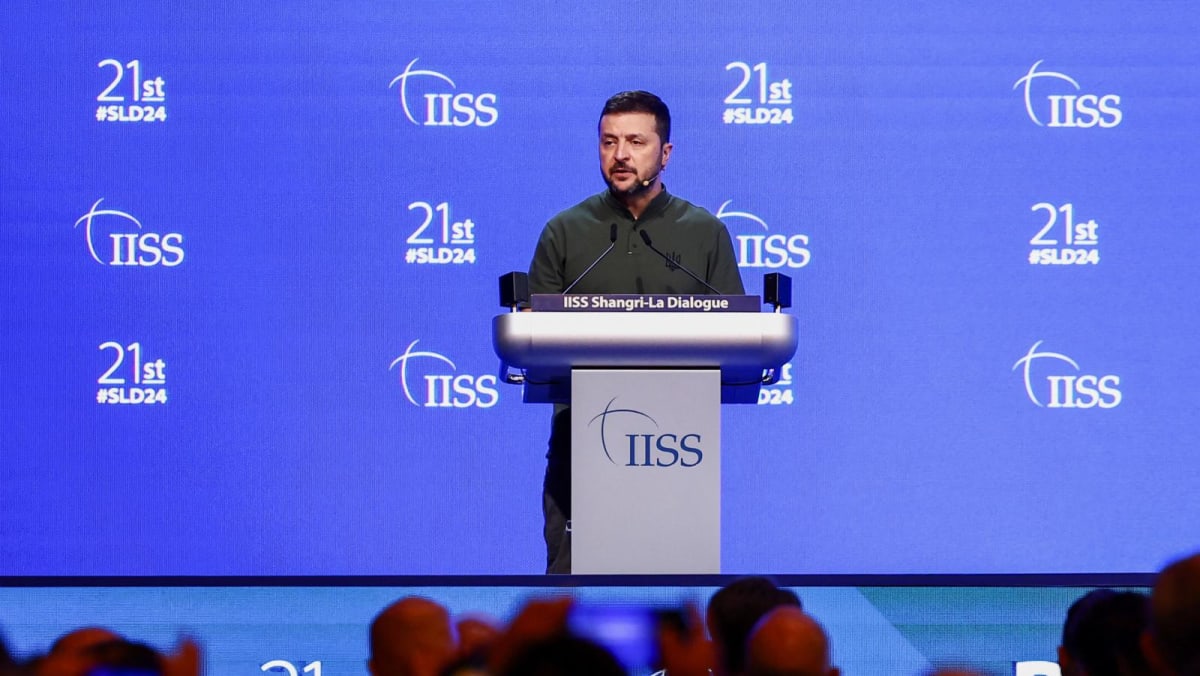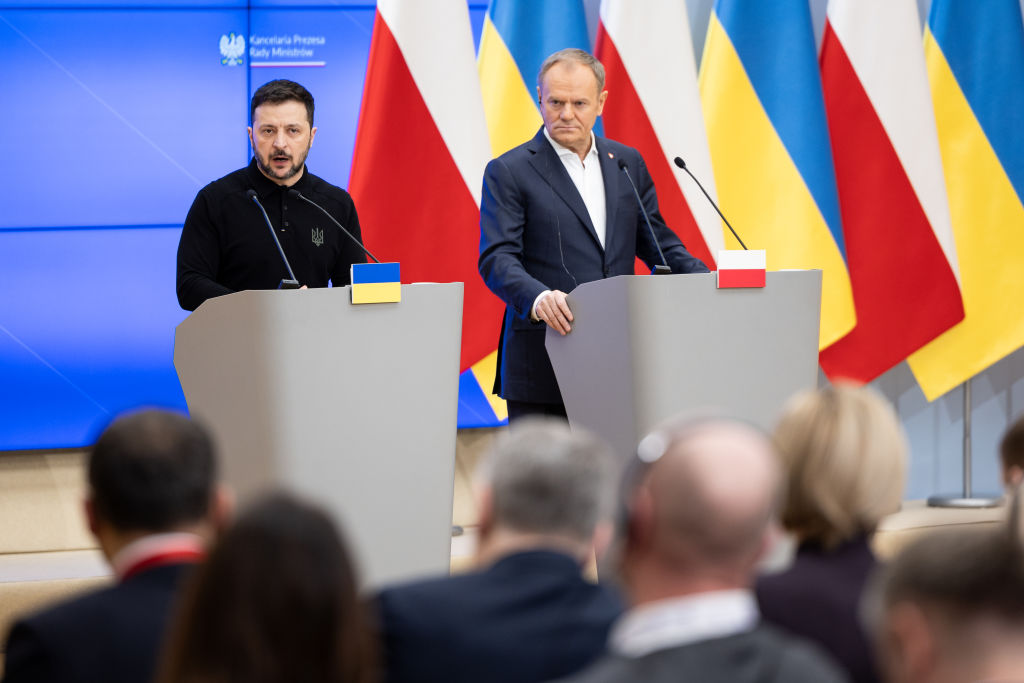Chinese Minister of National Defense Dong Jun launched an acerbic attack on what he called the “hegemonic powers” behind tension in the Asia-Pacific, a clear swipe at the United States and its allies.
In an address to the annual Shangri-La Dialogue security forum in Singapore, Adm. Dong said that people in the Asia-Pacific are “independent and self-reliant,” and were “against any attempt to turn our countries into vassal states or draw us into bloc confrontations.”
“Our people have firmly rejected infiltration, sabotage and coercion by outside forces,” the minister said, adding that regional countries “despise those who attempt to bolster themselves by taking orders from hegemonic powers.”
Dong also said China had exercised great restraint in the face of what he called “infringements and provocations” but warned “there is a limit to our restraint.”
Beijing has repeatedly accused Washington of assisting Taipei and Manila to stand up to its assertive actions in the Taiwan Strait and the South China Sea.
The Pentagon last month deployed an intermediate range missile system in the Philippines during the annual Balikatan military drills, which Beijing condemned as bringing “huge risks of war into the region.”
The U.S. House of Representatives has recently passed an $8-billion package to help Taiwan boost its defense capabilities against China.
Dong said that “some external interfering forces keep hollowing out the One China principle with the salami slicing strategy.”
“They have cooked up Taiwan-related legislations and continued to sell arms to Taiwan and have illegal official contacts with it.”
The minister, who took office five months ago after his predecessor was removed over suspected corruption, went on a lengthy tirade against Taiwanese leaders who he called “Taiwan independence separatists.”
China considers the democratic island one of its provinces and Dong said that China “will take resolute actions to curb Taiwan independence and make sure such a plot never succeeds.”
He accused Taiwan’s leaders of “betrayal of the Chinese nation and their ancestors,” and said they would be “nailed to the pillar of shame in history.”
“The Taiwan question is at the core of China’s core interests,” the minister said. “Anyone who supports Taiwan independence will only end in self-destruction.”
Defense analyst Malcolm Davis from the Australian Strategic Policy Institute, or ASPI, said that Dong “made clear a willingness for China to use force to prevent independence and respond to any external forces involved in supporting Taiwan.”
“It was a fairly predictable speech and very much the ‘party line’ with little in the way of new comments. In effect this was a propaganda speech and not an accurate statement of Chinese policy,” Davis said.
‘Wolf warriors’
But Dong’s tone did seem more combative than that of his predecessor, Li Shangfu, he added.
“On the South China Sea, he issued a warning that China won’t rule out the use of force specifically in relation to the Philippines and the support of the United States,” the Canberra-based analyst said, “That suggests to me that China does intend to escalate the crisis, and has singled out the Philippines as their focus with the goal being to coerce Manila to capitulate to Chinese interests.”
Unlike Li and his predecessors, Dong is not a member of the Central Military Commission of the Chinese communist party – the highest national defense organization.
“That may be the reason behind Dong’s tough statements to show his clout and get a promotion,” said an Asian analyst who didn’t want to be identified because of the sensitivity of the issue.
A Chinese academic praised Dong’s speech and said his attendance at the conference helped bring “China’s real voice” to the world.
“The Shangri-La Dialogue as a major security forum bears a great relevance to China,” said Gao Zhikai, vice president of the Center for China and Globalization and chair professor at China’s Soochow University. “It is important that China’s voice, which is increasingly in sharp contrast to that of the U.S., be heard.”
Several other Chinese delegates also promoted Beijing’s views at the forum, in a forthright manner known as “wolf warrior” diplomacy.
The term, adopted from the title of a Chinese movie, describes an assertive, even aggressive, approach to international relations.

Maj. Gen. Xu Hui, president of the International College of Defense Studies at China’s National Defense University, confronted Philippine President Ferdinand Marcos Jr. after the latter’s keynote speech on Friday, saying that Manila was risking ruining the “long-earned, long-lasting peace” within ASEAN by responding to Chinese vessels’ activities in the disputed South China Sea.
On Saturday, another Chinese delegate, Senior Col. Cao Yanzhong, a researcher at China’s Institute of War Studies, questioned U.S. Secretary of Defense Lloyd Austin about the U.S. alliance system in the region which Beijing compares to “an Asian version of NATO.”
During a session on ‘Maritime Law Enforcement and Confidence Building’ on Saturday, another Chinese delegate, Senior Col. Ge Hanwen, associate professor at the College of International Studies at China’s National University of Defense Technology, blamed the Philippines for “dramatically” raising tensions in the region and Japan for using water cannons first in a confrontation at sea.
Austin and Dong met for about an hour at the conference on Friday for talks aimed at improving their communications, a U.S. official said.
New regional order
A Western observer at the forum, speaking on the condition of anonymity, told Radio Free Asia that the Chinese delegates are “on a mission to spread Beijing’s messages and their statements are pre-scripted and pre-approved by the [communist] party.”
Beijing-based Gao denied that.
“It is only normal that people from all walks of life, including military officers, talk about the topics of their interest,” Gao said.
“China attends a lot of international forums because we believe in having our voice heard by as many people as possible.”
Dong acknowledged that different countries had different security interests and goals but he implied that China had a leadership role, said the ASPI’s Davis.
“He kept pushing the implication that China speaks for the region in terms of shaping the future of Asia-Pacific security order,” Davis said.
“China is clearly setting the basis for trying to assert its dominance over ASEAN, and if it can get [the] Philippines to submit to Chinese power through military coercion, then Beijing will expect other ASEAN states to also accept China’s interests,” said the Australian analyst.
“By default, China would then dominate the region.”
Over the past decade, the Chinese military has become more powerful, with its rapid growth bringing a new confidence, especially in relation with the United States.
The Center for Strategic and International Studies said in a recent report that China is the world’s largest shipbuilder with a capacity some 230 times larger than the U.S.
“One of China’s large shipyards, such as Jiangnan Shipyard, has more capacity than all U.S. shipyards combined,” the center said in its report.
“China is way ahead of the U.S. in many aspects and the Chinese economy is soon to be larger, too,” Gao, who served as a translator for Chinese leader Deng Xiaoping during the 1980s, told RFA.
“The Americans are worried about a rising China, that Beijing will impose its ideological and political system on the U.S.,” he said, while adding that in his opinion, that fear was unfounded.
“No one can really decouple from China and the best Washington can do is to deal with China on an equal footing.”
Lyle Goldstein from the U.S. think tank Defense Priorities said that Beijing was “not reckless or aggressive,” and despite the threats, it had not used force since the 1980s.
Despite a downward spiral in U.S.-China relations, Goldstein suggested that the two countries and their militaries, “should meet halfway and resolve disputes through diplomatic compromise.”
Edited by Mike Firn.




















Discussion about this post